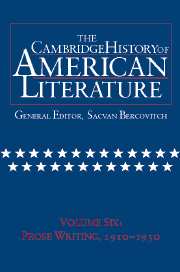Book contents
- Frontmatter
- Introduction
- A Cultural History of the Modern American Novel: Introduction
- 1 A Dream City, Lyric Years, and a Great War
- 1 The Novel as Ironic Reflection
- 2 Confidence and Uncertainty in The Portrait of A Lady
- 3 Lines of Expansion
- 4 Four Contemporaries and the Closing of the West
- 5 Chicago’s “Dream City”
- 6 Frederick Jackson Turner in The Dream City
- 7 Henry Adams’s Education and The Grammar of Progress
- 8 Jack London’s Career and Popular Discourse
- 9 Innocence and Revolt in the “Lyric Years”: 1900–1916
- 10 The Armory show of 1913 and the Decline of Innocence
- 11 The Play of Hope and Despair
- 12 The Great War and The Fate of Writing
- 2 Fiction in a Tme of Plenty
- 3 The Fate of Writing During the Great Depression
- Fictions of the Harlem Renaissance
- Ethnic Modernism
- Chronology
- Bibliography
- Index
6 - Frederick Jackson Turner in The Dream City
from 1 - A Dream City, Lyric Years, and a Great War
Published online by Cambridge University Press: 28 March 2008
- Frontmatter
- Introduction
- A Cultural History of the Modern American Novel: Introduction
- 1 A Dream City, Lyric Years, and a Great War
- 1 The Novel as Ironic Reflection
- 2 Confidence and Uncertainty in The Portrait of A Lady
- 3 Lines of Expansion
- 4 Four Contemporaries and the Closing of the West
- 5 Chicago’s “Dream City”
- 6 Frederick Jackson Turner in The Dream City
- 7 Henry Adams’s Education and The Grammar of Progress
- 8 Jack London’s Career and Popular Discourse
- 9 Innocence and Revolt in the “Lyric Years”: 1900–1916
- 10 The Armory show of 1913 and the Decline of Innocence
- 11 The Play of Hope and Despair
- 12 The Great War and The Fate of Writing
- 2 Fiction in a Tme of Plenty
- 3 The Fate of Writing During the Great Depression
- Fictions of the Harlem Renaissance
- Ethnic Modernism
- Chronology
- Bibliography
- Index
Summary
Standing in the Dream City – within “the greatest city of modern times: Chicago, the peerless,” as John Flinn’s Official Guide to the World’s Columbian Exposition (1893) called it – and speaking to members of the American Historical Association, Frederick Jackson Turner, a young professor from Wisconsin, delivered his famous address, “The Significance of the Frontier in American History.” The dominant traits of the nation – strength and inventiveness of mind, buoyancy and exuberance of spirit, “restless, nervous energy,” and “dominant individualism” – Turner said, were “traits of the frontier, or traits called out elsewhere because of the existence of the frontier.” “The true point of view” in U.S. history, therefore, was “not the Atlantic coast” but the “Great West.” Since the days when Columbus sailed, he added, in a line that embraced the nation’s emerging political economy as well as its storied past, “America has been another name for opportunity, and the people of the United States have taken their tone from the incessant expansion” virtually forced upon them by their environment. The “expansive character of American life,” he predicted, would go on demanding “a wider field for its exercise.”
At times, Turner seemed to be looking forward, anticipating the war that would come in 1898, when, following President McKinley’s “Open Door” policy, the nation started seeking “wider fields.” When his gaze fixed on the past, however, it almost stopped short, arrested by the sense of an ending: “Never again will such gifts of free land offer themselves.” Despite his exuberance, Turner’s tone is, as a result, often elegiac.
- Type
- Chapter
- Information
- The Cambridge History of American Literature , pp. 43 - 47Publisher: Cambridge University PressPrint publication year: 2002

